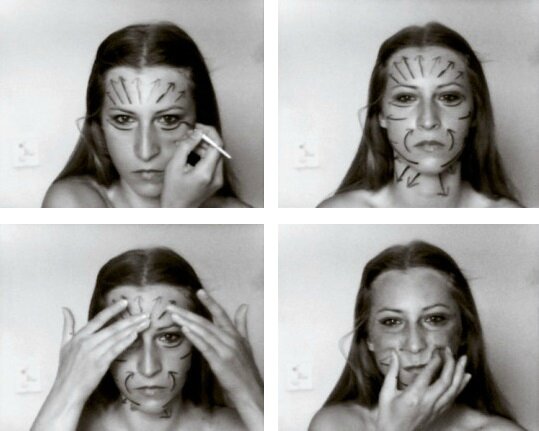SANJA IVEKOVIC
On May 10, 1979, Sanja Iveković engaged in an act of political defiance when she performed Triangle on the balcony of her Savska Street apartment during one of Josip Broz Tito’s official visits to Zagreb. During the festivities, she came out, dressed in an American T-shirt, onto her balcony, which overlooked the street along which the presidential motorcade slowly advanced. She sat in a chair with a glass of Ballantine’s whiskey, cigarettes, and some foreign books next to her on a small table. Once settled, Iveković picked up Tom Bottomore’sElites and Society, a 1964 sociological study of power relationships in modern society, and, as she read, pretended to masturbate. She knew she was being watched by an agent of the Communist secret police stationed atop the Hotel Intercontinental across the street, and the titular triangle completed itself when, 18 minutes into the performance, the police rang Iveković’s doorbell and commanded her to stop her activities. Tapping the persuasive language of political performance, Iveković offers a critique of the masculine cult of the leader and its Soviet-style system of political surveillance.
La Yougoslavie des 70s. Sanja Ivekovic la connait bien. Période figée, décidée, mesurée au millimètre près. Sauf que pour la jeune artiste, elle peut être bien plus que ça. C’est ainsi que la Nouvelle Pratique artistique voit le jour, avec pour ambition un travail culturel alternatif en prise direct à la société, et loin des canons imposés par un pouvoir toujours plus oppressant.
Préoccupée par des questions de genre, d’identité et de mémoire, Sanja n’en oublie pas sa condition de femme artiste et réalise très tôt des œuvres féministes, comme Tragedy of a Venus(1975), Bitter Life (1975-1976) ou Make Up-Make Down (1978). Elle y critique la manière dont les médias représentent la femme, et plus particulièrement la pression imposée par la société à travers le boom de la chirurgie esthétique, dès la fin des 70s (Instructions).
Debunking clichéd notions of beauty has been especially instrumental to Iveković’s practice, which draws attention to the politics of gender representation in consumer society, such as in Make Up—Make Down, in which the artist performs the familiar routine of applying makeup at an unusually slow pace, converting an ordinary act into a fetishistic ritual. The video shows the artist’s cleavage and hands in close-up as she rehearses intimate, sensual gestures—opening and closing a tube of concealer, rolling a lipstick up and down in its case, fussing with mascara, and running her finger over the tip of an eyeliner pencil. Her face is kept offscreen, a strategy that critic Tom Holert has linked to a crisis of subjectivity. The crux of Make Up—Make Down and Iveković’s other early experiments in video is the exposure of society’s unrealistic vision of femininity—a perfect image designed according to the trends, icons, and fashions found in the pages of glossy magazines and on television.
En 1994 elle devient cofondateur d'Electra, un centre d'art féminin à Zagreb. Celle que certains qualifie d'anti-Abramovic (Ivekovic s'est toujours tenue loin des circuits artistiques à forte valeur commerciale et s'est toujours refusée à quitter son pays) a su pourtant marquer de son emprunte une époque trouble, et a gagné aujourd'hui une reconnaissance mondiale, à travers des rétrospectives organisées au MOMA en 2011, à la South London Gallery, ou encore le MAC/VAL en 2012.










/https%3A%2F%2Fstorage.canalblog.com%2F49%2F41%2F1277032%2F133272095_o.jpg)
/https%3A%2F%2Fstorage.canalblog.com%2F77%2F03%2F1277032%2F133168507_o.jpg)
![THE PLEASURE SEEKERS / CRADLE [sisters quatro]](https://image.canalblog.com/01Z82qF0A3EqF7hPMRFZ3Yx_p38=/400x260/smart/filters:no_upscale()/https%3A%2F%2Fstorage.canalblog.com%2F24%2F75%2F1277032%2F133038605_o.jpg)
/https%3A%2F%2Fstorage.canalblog.com%2F67%2F06%2F1277032%2F131252729_o.jpg)